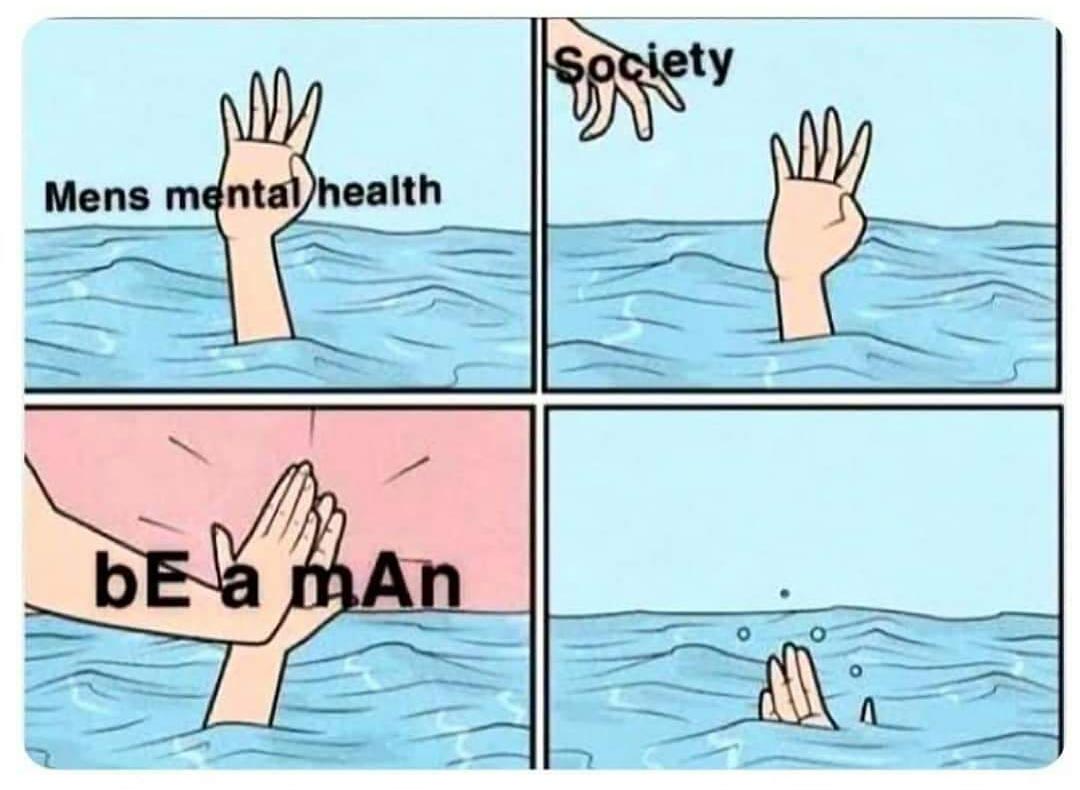Dear Men, We Need To Talk About Mental Health
Globally, a man dies every minute from suicide. In all countries across the world, twice as many men as women take their life. In the US, 3.5x more men die by suicide than women. According to the World Health Organization, every year, around 800,000 people died by suicide. Most are men.

Why are men struggling – and what can we do to help?
One of the key contributing factors as to why more men die by suicide than women is masculine social norms – the unwritten collective rules about how men should behave. There is increasing awareness about how some of these norms have impacted men, but it is worth talking more explicitly about how masculinity norms can hurt men’s mental health.
Masculine social norms
Feeling
From a young age, boys are taught that they should not have or give in to feelings or emotions. Phrases like, “boys don’t cry”, “man up”, “toughen up”, discourage boys and men from openly expressing emotions or talking about problems. It teaches them that to feel or have emotions makes them weak and feminine. As a result, many men grow up not being able to recognize when they are experiencing mental health issues because they’ve had to become so adept at cutting themselves off from their feelings and emotions in order to be perceived as “men” and “manly”. In therapy, often what we do is help men re-attune to their bodies and generally what’s going on with them internally. This simple practice of naming and acknowledging feelings can be hugely helpful and cathartic.
Asking for help
Masculine norms also govern the way men seek help. Depression in men often manifests in anger and irritability rather than sadness and tearfulness, which can alienate them from others when they need help the most. Masculinity encourages men to tough it out alone and “grow a pair” to deal with issues on their own. A 2016 study by Mind UK found that men are twice as likely as women to have no one to rely on for emotional support. This self-reliance can be helpful in many life situations but it can also lead to poorer mental health outcomes, particularly more depressive symptomatology, by reducing the chance they’ll seek the help they need. In turn, this can lead to more unhealthy coping strategies (such as substance use or workaholism, amongst others) as they try to cope alone. Asking for help is often seen as a weakness and this discomfort in reaching out can also leave men isolated from the social networks that could help them through rough patches.
Male friendships
Men tend to engage in friendships differently than women. Generally it is found that women prefer dyadic relationships whereas men favor larger, all-male cliques. There is a tendency for male friendships to be more activity-based, less intimate, and more transactional. On the other hand, female friendships include more sharing of thoughts and feelings and include more support. This lack of emotional closeness in male friendships is said to place them at greater risk of depression, heart disease and stroke.
This is slowly changing, and men are increasingly engaging in more open and communicative friendships with other men. This cultural shift is also being mirrored in TV series and films that are showing portrayals of men empathizing with other men and being more vulnerable.
Ted Lasso Roy Kent GIF from Ted Lasso GIFs
What can we do to help?
Talk to the men in your life about masculinity norms and how they can hurt mental health. Ask them about their male friendships and who they can turn to for emotional support. Check in with them about how they’re feeling. For too long, vulnerability has been cordoned off into the realm of the feminine. The more we talk to men about their mental health and check in with them, the more we make it okay for them to talk about how they’re feeling and for that to be acknowledged as a sign of strength.
A tool to help you start the conversation
ALEC is an acronym to help you remember the four steps of having a conversation with a man in your life who might be struggling. It was developed by “R U OK?”.
A: Ask how he feels. It might be helpful to mention any behavioral or mood changes you’ve noticed as you check in.
L: Listen. Give your undivided attention
E: Encourage action. Perhaps there are some simple things he can focus on
C: Check in. Follow up once you’ve had the conversation
For more information, check out this movember conversations tool.
Podcasts and blogs that talk about healthy masculinity
If you are interested in scheduling a session with Bhavna Bharvani or have further queries, please contact us today.
References
https://hk.movember.com/about/mental-health
https://www.bbc.com/future/article/20190313-why-more-men-kill-themselves-than-women
https://journals.plos.org/plosone/article?id=10.1371/journal.pone.0118329

